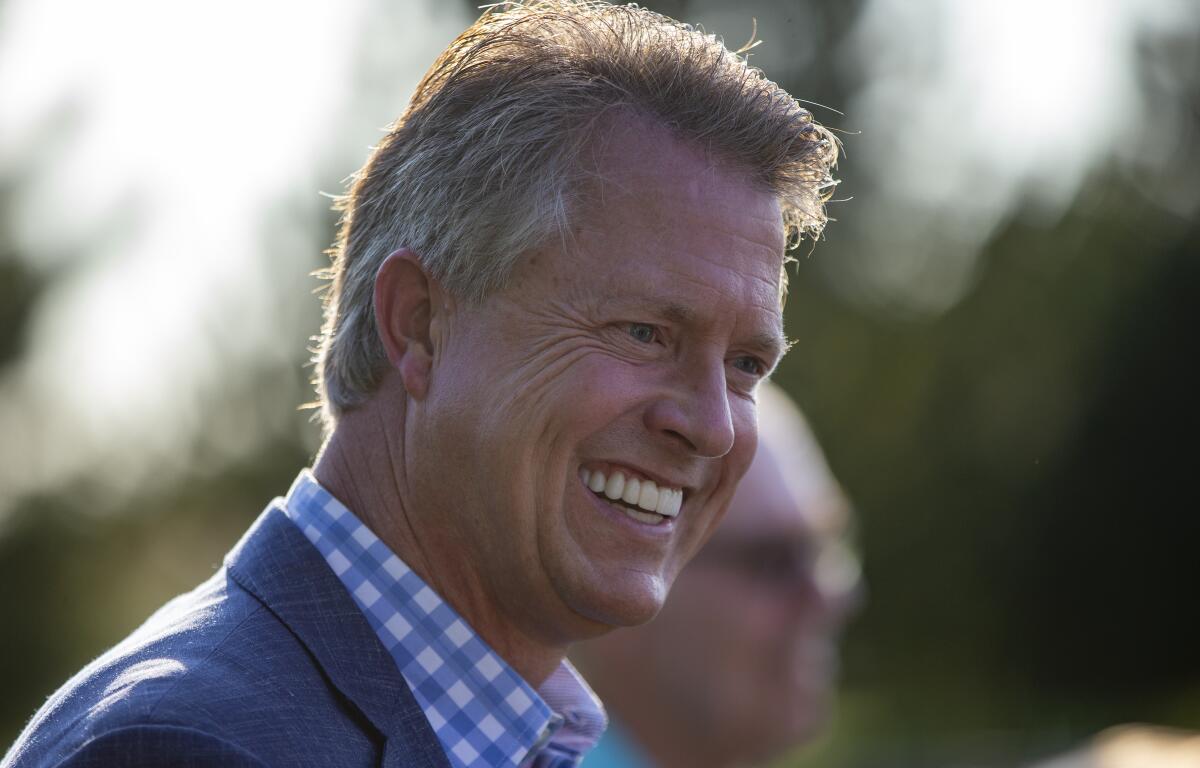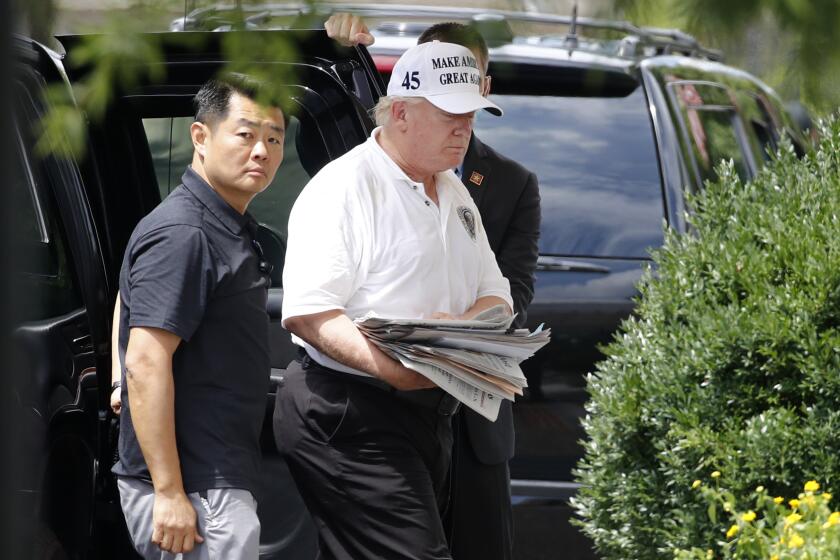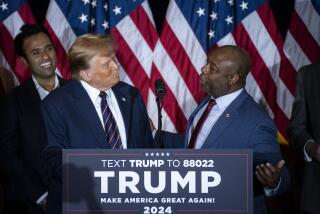Kansas GOP picks Rep. Marshall for Senate seat over Kobach

- Share via
TOPEKA, Kan. — Kansas Republicans on Tuesday nominated Rep. Roger Marshall for the Senate instead of polarizing conservative Kris Kobach, heeding the party establishment’s advice for keeping a normally safe seat out of play in what could be a difficult year for the GOP.
Marshall prevailed in a crowded primary field with the backing of major farm, business and anti-abortion groups but without a pre-election endorsement from President Trump sought by Senate Majority Leader Mitch McConnell and others for the two-term congressman for western and central Kansas. Marshall overcame Kobach’s reputation as a conservative firebrand and informal advisor to Trump.
Marshall will face Democratic state Sen. Barbara Bollier, a former lifelong moderate Republican who received national attention at the end of 2018 by switching parties.
Kobach, the former Kansas secretary of state, is nationally known for advocating restrictive immigration policies and alienated independent and moderate GOP voters in losing the Kansas governor’s race in 2018. Marshall and his allies made that loss a key issue as he and Kobach battled atop the GOP field.
Bob and Debbie Rosenberger said Kobach’s loss in 2018 was on their minds as they cast their Republican primary ballots for Marshall at a southwest Topeka church. The retired 62-year-old postal worker and his wife, a retired, 63-year-old nursing home supervisor, said they are Trump supporters and believe Marshall will help him in the Senate.
As for Kobach, Bob Rosenberger said, “Bottom line, I just don’t trust him as much as Roger Marshall.”
The GOP’s internal splits over a post-Trump future have become increasingly obvious, slowing legislation and affecting campaign strategies.
The race for retiring four-term Republican Sen. Pat Roberts’ seat had national implications even though the GOP hasn’t lost a Senate contest in Kansas since 1932. Republicans are trying to keep their 53-47 Senate majority with competitive races in other states, including Arizona, Colorado and Maine.
Marshall immediately called for party unity at a watch party at a winery southwest of his central Kansas hometown of Great Bend. He said the GOP’s Senate majority is at stake in his race and said he was strengthened by the contentious primary.
“I’ve always believed in iron sharpening iron,” Marshall said in his livestreamed remarks.
Even with Marshall as the nominee, the GOP faces a potentially competitive Senate race. Bollier had raised more than $8 million through July — and her campaign said Tuesday night that the total is now $9 million — a big sum in a low-cost media state like Kansas, with donations flooding in from outside the state.
Bollier is a retired Kansas City-area anesthesiologist, while Marshall is an obstetrician.
Marshall raised about $2.9 million and Kobach, a little more than $1 million. Bob Hamilton, the founder of a Kansas City-area plumbing company, largely self-funded a campaign heavy on television ads with $3.5 million in personal loans. Those figures were all dwarfed by PAC spending in the primary, which totaled about $11 million.
In Central Valley and other conservative parts of California, small but significant numbers of Republican voters have turned against Trump.
Hamilton had a strong showing in running behind Kobach and Marshall in early returns.
Marshall, Kobach and Hamilton and eight other candidates made the field the largest for the GOP since the state began holding Senate primaries more than 100 years ago. Kansas has no runoff elections, so if the anti-Kobach vote had splintered enough, he might have won with only his solid base on the right.
Dean Crenshaw, a 53-year-old welder from Belle Plaine in south-central Kansas, voted for Kobach for his conservative views despite believing that Democrats preferred to have Bollier face Kobach.
He said he was torn between voting for Kobach and Marshall but didn’t know much about Marshall, and he “just voted for the guy I knew the most about.”
McConnell’s first choice in the race was U.S. Secretary of State Mike Pompeo, a former Wichita-area congressman, but while Pompeo made multiple visits to Kansas suggesting interest, he definitely declared himself out in January.
Kobach argued that the issues he’s often emphasized — particularly immigration — would play better in a fall Senate campaign and said he’d benefit from a flood of pro-Trump voters going to the polls in November after skipping voting in the 2018 midterms.
Roberts declared his support for Marshall after the congressman had picked up endorsements from the U.S Chamber of Commerce, the Kansas Farm Bureau, the National Right to Life Committee and Kansans for Life, the state’s most influential anti-abortion group. Marshall also had the backing of 97-year-old political icon Bob Dole, the former U.S. Senate majority leader and 1996 GOP presidential nominee.
More to Read
Get the L.A. Times Politics newsletter
Deeply reported insights into legislation, politics and policy from Sacramento, Washington and beyond. In your inbox three times per week.
You may occasionally receive promotional content from the Los Angeles Times.











